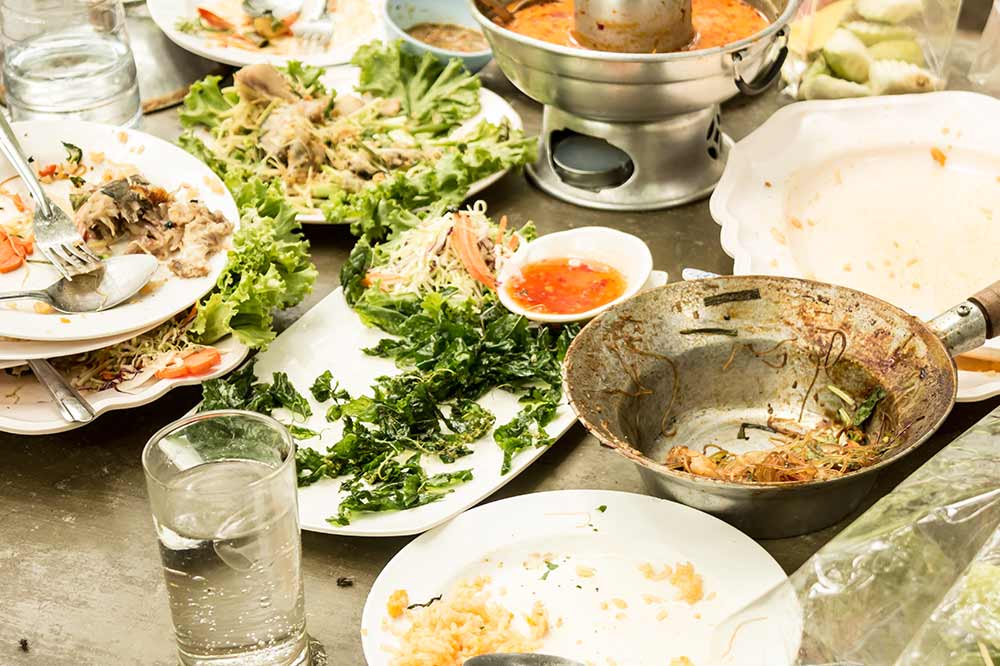As travelers, we have all been guilty of ordering more food than we can eat – and ninety nine times out of hundred, we do not finish what we have ordered. We neither care to parcel the leftovers or give it away and the perfectly edible food lands in the bin, of no use to anyone.
Table of Contents
Familiar scenario?
Absolutely and that is the reason for writing this. I want to throw light on some of the genuine problems faced by a large number of travelers, especially long term travelers inadequately prepared or to an extent, plain unlucky travelers who have to appeal to the human side of man.
An acquaintance, Samantha Sabelle, happily told me once how she helped herself to a co-passenger’s hardly consumed flight-meal. Samantha, a twenty something graduate from Washington DC was backpacking in South East Asia – “On a plane from Kuala Lumpur to Koh Phangan I sat next to a passenger who had a pre-booked meal. He took one bite of it and didn’t touch the rest. I asked him if he liked it and he said no, so I asked if I could have the rest. He kindly let me,” she says. “I didn’t see any harm.”
I say, bravo Samantha. One man’s waste is another man’s meal.
I have had similar experiences in the past, but Samantha’s admission of it drove home an important point. I was not alone in this world of food-sharing or food-grabbing people and that it was perfectly alright to do so. Acceptance was hard, but on hearing her story, I decided to address this important point.
Would I do the same? Yes.
I was returning from Bali after a week spent at sea and tracking Komodo Dragons on Komodo Island in the year 2008. I was on Singapore Airlines heading to Singapore from Jakarta and happened to sit next to an extremely well dressed, polite man, who quietly watched me, sun burnt and extremely dirty. The food arrived. I was hungry and wanted to eat normal, non-Balinese food. Having finished everything on my tray, I looked longingly at my neighbours meal. It was nearly untouched. Finally I asked him if I could take it. I was so hungry it didn’t matter what he’d think or if it was proper to ask. He offered it to me without hesitation.
His name was Christian Pauli and we are still friends today.
When writing this article, I asked him if he remembered that day and what he thought of the idea of sharing left-overs. Would he reverse roles with me? His answer took me by surprise.
“Sharing is caring and doesn’t matter if you are female or male and known to each other. There is nothing wrong with it. Think about a traditional Swiss cheese fondue where all the forks go into the same shared pot. After having eaten from them, I am also not too concerned about germs/diseases or sharing.”
The history of sharing food
The long history of travel is full of kind people offering homes or food to complete strangers; and like Samantha, there are stories of people helping themselves to stranger’s meals or homes or money, some stemming from need and some, resulting from bad judgement. But for young backpackers traveling in cheaper destinations like South East Asia, this has become a common practice.
Today it is not uncommon to see backpackers traveling on tight budgets unashamedly help themselves to leftovers at restaurants. The neediest of the pack have been known to walk up to the diner to ask for leftovers, rather unashamedly.
I know this because it happened with me in Cambodia and once in China.
While the traveling community and social media have expressed disgust at this behaviour, and countries like Thailand now resort to verifying funds before issuing visas to those renewing at Thai borders, especially long term Western backpackers, crudely referred to as “begpackers” after internet exploded with pictures of them begging in street corners or scrubbing toilets to pay for their stay in these countries.
“Taking home ketchup sachets or sugar from McDonalds in one thing, but to actually ask for leftovers…is quite another. It is disgusting If they cannot afford to travel, why do they?” is the common topic for internet-shaming.
But take Amanda Holden from Oregon, US. In 2016 Amanda made headlines when she went on record saying she saved $30k through eating leftovers from friends and dumpsters for eight months so she could travel the world. She earned the title of “Dumpster Dog” but went on to travel the world with the money she saved.
That, many would say is a bit extreme. But according to her – whatever floats her boat!
Coming back to eating leftovers – like many, I have been in situations when out of the blues, people (mostly men) have come up to me asking to take my leftover food even before I have called for the bill.
Does need transcended all cultural norms of sharing or asking for food?
Social experiments have been conducted on this and every one of them has resulted in one thing – people will share and people will ask. If you do not associate asking for left overs with “poverty” or “social taboo” this trend will continue.
An experiment
In 2010, when I was traveling through Cambodia, I came across Stefan, a South African sailor stranded in Cambodia, living off the kindness of the hostel -owner and peddling marijuana to tourists. The scenario was typical. I had ordered an entire chicken – food in Cambodia was cheap. I hadn’t noticed that I (or my food) was being watched but when I rose from the table leaving three quarters of the chicken untouched, a bedraggled man walked up to me and asked for my food. He was Stefan. I was embarrassed because I didn’t know the right thing to say, but he happily sat at my table and ate it all. For the next few days I stayed there, I always left my uneaten food for Stefan to pick up later.
Similar occurrences happened pretty often till I decided to change roles. I was waiting at Dubai International Airport food court, waiting for my flight to New Delhi for the launch of my book. I saw a young man with a McDonald’s meal sit by himself and walked up to him. I asked him if I could sit down. He was polite.
Then I asked him if I could have his fries.
He was shocked but quickly pushed the tray towards me saying I could eat his burger too. I helped myself to his fries while he continued to stare at me. He seemed embarrassed and didn’t know what to say. I sensed his discomfort. When I was done, I told him the reason. His name is Vibhor Aggarwal. We are friends today. I once asked him if he would do the same – would he offer his food to anyone who asked, or better still, would he ask for food if needed, from a stranger? He said he couldn’t. He wouldn’t! “People might not be too kindly if a man asked, maybe, you are a girl, maybe that helps.”
Contrary to what he said, I have always been asked for my food by men. Rarely have I come across women who did.
In France, I tried another experimented. I ordered coffee in a rather upmarket French cafe. When the bill arrived, I looked horrified and said I didn’t have the money to cover the bill, watching the reactions of the patron and the waiter. A man on the next table whipped out his wallet and gave the waiter 10 Euro. I kept mum. The waiter took the money and returned a few minutes later, with the 10 Euro note and another cup of coffee and said “For you madam, it is on the house.”
I returned the money and left a huge tip, after first explaining why I did what I did.
I am not sure if this happened because I am a woman – would it be any different if it were a man? But the reality is that, people are kind and don’t mind sharing. That is the bottom line – if you ask, you will get.
I don’t believe it is about being a man or a woman – it is about the need. But let me be honest, I wouldn’t know what it would mean to be really in need of food and not have the means to buy it. So I asked opinions of people who found themselves on either side of the fence.
Why and why not
I always ask fellow travelers if they had ever been on either side of the fence. Laura Pierce, a young lady I met in Thailand told me a story. “I went to a tofu festival once, and bought a small tray of tofu. It looked quite tasty, but after eating half of it I was done with it. When I went to throw it into the garbage, a hand came from the other side of the trash can at the same exact moment, and took the tray of leftover tofu. My eyes followed the man’s arm, and saw desperation in his eyes. He thanked me, and I have never looked at leftovers the same way again. I make the effort to ask people if they want it. They either say yes or no – but no one minds very much.”
Few travellers have admitted to taking leftovers because they really want it and not out of desperation. Half-consumed wine bottles, pizza and salads are very popular for scroungers. My belief is that in some countries, it is a stigma because it suggests poverty. In most places, being wealthy has come to be equated with being wasteful. Conserving resources is seen as being cheap. Since food is generally seen as being plentiful in few countries, it is therefore considered cheap and desperate to conserve it or share it.
In the Asian sub-continent it is culturally repugnant to share food. Once someone has eaten any food from a plate the remaining food becomes (ritually polluted) and should not be eaten by anyone else and is only fit for animals. This practice was probably borne out of a vague understanding of disease transmission.
So it all boils down to germs. What about the germs, you will ask? I suppose, if you don’t know where your next meal is coming from and you’re constantly eating shitty food from convenience stores and fast food restaurants then your attitude towards germs changes a lot.
Germs? asks Tanya Woods, a member of an online travel community when I posed this question. “What germs are we talking about here? We all know travelers, solo or otherwise have a tendency to hook up with total strangers – so when you don’t mind kissing the mouth of a stranger, you are worried about eating germs from left-over food? Germs are a stupid argument to have. What you are concerned is what people might think of you so – so don’t say I won’t eat leftovers “whatever comes” because you are worried about the germs. That is rubbish.”
Something similar to what Christian Pauli told me about eating Swiss fondue.
“If you can eat fondue with your friends, you can be assured no germ is going to get to you.”
Round up
It’s perfectly alright to ask for leftovers if you need it and think it is going to waste.
It is perfectly alright to offer your food to people you think might appreciate it. There are far worse ways to get infection, than from eating other people’s food.
Do not look down on people who are forced to live off other’s peoples plates – it could just be something they do to tide over.
While a few countries in the world consider it a social taboo, some others think it is a perfectly normal habit. Chose wisely.




